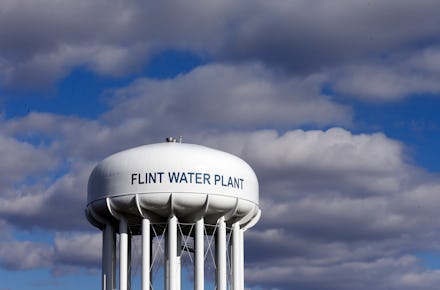The 7 human rights issues that will shape the next generation

Nothing about the future is ever entirely certain. In a time of growing anxiety, shifting international power balances and technological change, the inherent uncertainty of what comes next can be more overwhelming than usual — especially for the historically disenfranchised people most at risk of being pushed further to the margins in a changing global landscape.
But the clash of worldwide social justice movements and the backlash against them also presents an enormous opportunity for progress on some of the most pressing human rights issues of our time. In the United States and around the world, battling myriad forms of bigotry — racism, misogyny, xenophobia, homophobia and religious intolerance — go hand in hand with securing access to healthcare, safe housing, bodily autonomy, privacy and other basic civil rights.
This battle will continue for the next generation — and these are the issues that will define their lives and livelihoods for years to come.
1. Refugee crises
Throughout the 2016 election, the debate over whether or not the U.S. should welcome refugees displaced by the civil war in Syria fueled everything from hateful comments, comparisons to the Holocaust to pleas for compassion. Among other atrocities, the use of chemical weapons against civilians has led to mass migration out of the war-torn country, but the Syrian refugee crisis is one of many.
According to the United Nations, there are at least 65 million refugees who have been forcibly displaced from their homes around the world. Asylum-seekers face violence in relocation camps and during migration journeys, contributing to a massive spike in refugee deaths. Migrants have flooded Europe at record rates from Somalia, Afghanistan, Iraq and other countries, sparking concerns about their safety as well as xenophobic backlash.
2. Anti-LGBTQ discrimination
Civil rights don't mean much without any meaningful ability to exercise them, a reality LGBTQ folks around the world know all too well. It's nothing short of a travesty that the number of freedoms afforded queer and non-binary people in the U.S. is great compared to nations where homosexuality is restricted, criminalized or punishable by death. Considering the violence and discrimination LGBTQ people face in the land of the "free," where going to the bathroom is contentious and going to a nightclub can mean putting one's life at risk, that's deeply troubling.
In addition to experiencing poverty, health issues and housing discrimination at higher rates than the heterosexual or cisgender population, homicide rates for LGBTQ people — especially black trans women — are disproportionately higher than for other demographics in the U.S. Marriage equality was just the beginning.
3. Violence against women
Arguments for respecting all human beings' dignity aside, there's a strong case to be made against global sexism: It's really friggin' expensive. Economists estimate patriarchal gender norms that keep women dependent, subjugated and without earning power or education keep GDPs from going up, while gender-based violence can make a country's GDP worse. Higher rates of violence against women also have also been correlated with higher rates of poverty and poorer public health outcomes. There's a reason Hillary Clinton gets quoted on the issue so often: women's rights are human rights — and until they're secured, they'll be a human rights issue.
4. Water crisis in Flint (and elsewhere)
Widespread lead poisoning in Flint, Michigan, has made the city a quintessential example of government negligence and mistreatment of poor communities of color. The public health crisis, which has left a city of nearly 100,000 without clean water in one of the wealthiest nations of the world, isn't the only one of its kind.
Flint is one of many places where people lack access to clean water. Public officials' utter inattentiveness to low-income communities has left towns like St. Joseph, Louisiana, without potable water for over a decade. Across the globe, an estimated 663 million people — roughly 1 in 10 — don't have access to clean water.
5. Surveillance and cybersecurity
Cybersecurity has been called the "new battleground" for human rights, and — given the impact hacking has already had on the future of global diplomatic relations — that doesn't seem to be an overstatement. As people around the world increasingly live their lives online, combatting digital surveillance and ensuring cybersecurity has come to be conflated with protecting national security and physical infrastructure; individuals' medical records, personal property and financial information; freedom of expression and a basic right to privacy (not to mention independent thought).
6. Police brutality
Already central to the Black Lives Matter movement, the leading 21st century civil rights movement in the U.S., fighting law enforcement's attacks on marginalized groups will only become more critical during the Trump years. The incoming administration has promised a return to "law and order," which for decades has been code for racialized double standards in law enforcement and state-sanctioned violence against people of color, particularly African-Americans. The inordinate rate of black homicide at the hands of police officers and vigilantes as well as high rates of incarceration perpetuate poverty in black communities — not to mention extreme racial animosity and violence throughout society.
7. Climate change
Global warming might literally be the human rights crisis to end all human rights crises. Climate change is already impacting people's lives, forcing them from their homes, depleting resources vital to their livelihoods and even creating new health issues. The effects of a warming planet have already led to smaller crises in all corners of the world:
Natural disasters, including horrific flooding and extreme heat, are estimated to cause a total of 250,000 additional deaths annually. Climate change also has an indirect impact on the economy, and is expected to cost at least $2 billion by 2030. Morbid as it might be, failing to solve this crisis could be the solution to all the others.